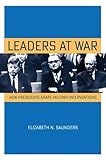Leaders at war : how presidents shape military interventions / Elizabeth N. Saunders.
Material type: TextSeries: Cornell studies in security affairsPublication details: Ithaca, N.Y. : Cornell University Press, 2011.Description: 1 online resource (ix, 302 pages)Content type:
TextSeries: Cornell studies in security affairsPublication details: Ithaca, N.Y. : Cornell University Press, 2011.Description: 1 online resource (ix, 302 pages)Content type: - text
- computer
- online resource
- 9780801460999
- 0801460999
- War and emergency powers -- United States -- History -- 20th century
- Politics and war -- United States -- History -- 20th century
- Presidents -- United States -- History -- 20th century
- Political leadership -- United States -- History -- 20th century
- Intervention (International law) -- History -- 20th century
- United States -- Military policy -- 20th century
- United States -- Foreign relations -- 1945-1989
- Politique et guerre -- États-Unis -- Histoire -- 20e siècle
- Présidents -- États-Unis -- Histoire -- 20e siècle
- Intervention (Droit international) -- Histoire -- 20e siècle
- États-Unis -- Relations extérieures -- 1945-1989
- POLITICAL SCIENCE -- American Government -- Executive Branch
- HISTORY -- United States -- State & Local -- General
- Diplomatic relations
- Intervention (International law)
- Military policy
- Political leadership
- Politics and war
- Presidents
- War and emergency powers
- United States
- 1900-1999
- 973.92092/2 22
- JK558 .S38 2011eb
| Item type | Home library | Collection | Call number | Materials specified | Status | Date due | Barcode | |
|---|---|---|---|---|---|---|---|---|
 Electronic-Books
Electronic-Books
|
OPJGU Sonepat- Campus | E-Books EBSCO | Available |
Includes bibliographical references (pages 275-292) and index.
When and how states intervene -- Defining and explaining intervention -- Dwight D. Eisenhower -- John F. Kennedy -- Lyndon B. Johnson -- Before and after the Cold War -- The role of leaders : conclusions and implications.
Print version record.
The use of military force to intervene in the domestic affairs of other states is one of the most contentious issues in contemporary foreign policy. He the author provides a framework for understanding when and why great powers seek to transform foreign institutions and societies through military interventions. She highlights a crucial but often-overlooked factor in international relations: the role of individual leaders. Focusing on the Cold War presidencies of Eisenhower, Kennedy, and Johnson, it is shown that these leaders' threat perceptions influenced both the decision to intervene and the choice of intervention strategy--specifically, whether they believed that threats ultimately originated from the internal characteristics of other states. The author also explores this theory's applicability to other historical and contemporary settings including the post-Cold War period and the war in Iraq.
In English.
eBooks on EBSCOhost EBSCO eBook Subscription Academic Collection - Worldwide
There are no comments on this title.

